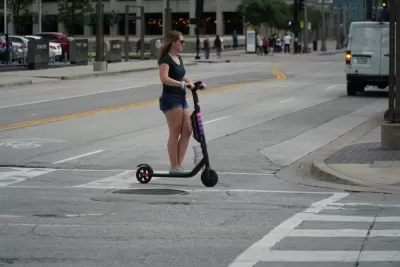Lyft is ceasing operations of its electric scooter business in six U.S. cities, citing the lack of population density as a reason business struggled in those markets.

"Lyft notified employees [November 14] that it’s pulling its scooters from six markets: Nashville, San Antonio, Atlanta, the Phoenix area, Dallas and Columbus," reports Megan Rose Dickey.
"Lyft landed on this decision because it found that cities with the greatest population density are best for micromobility, and those six markets are not included in that group," according to Dickey.
Lyft joins a few other companies in scaling back operations this year. Uber also pulled JUMP bikes and scooters from a few of markets—like San Diego, Providence, and Atlanta—earlier this year. Uber's problems in Los Angeles, however, were caused by tangles with regulators.
The cutbacks also mean Lyft is laying off employees, about 20 of a total team of 400 working on bikes and scooters at the company.
FULL STORY: Lyft is ceasing scooter operations in six cities and laying off 20 employees

Maui's Vacation Rental Debate Turns Ugly
Verbal attacks, misinformation campaigns and fistfights plague a high-stakes debate to convert thousands of vacation rentals into long-term housing.

Planetizen Federal Action Tracker
A weekly monitor of how Trump’s orders and actions are impacting planners and planning in America.

In Urban Planning, AI Prompting Could be the New Design Thinking
Creativity has long been key to great urban design. What if we see AI as our new creative partner?

King County Supportive Housing Program Offers Hope for Unhoused Residents
The county is taking a ‘Housing First’ approach that prioritizes getting people into housing, then offering wraparound supportive services.

Researchers Use AI to Get Clearer Picture of US Housing
Analysts are using artificial intelligence to supercharge their research by allowing them to comb through data faster. Though these AI tools can be error prone, they save time and housing researchers are optimistic about the future.

Making Shared Micromobility More Inclusive
Cities and shared mobility system operators can do more to include people with disabilities in planning and operations, per a new report.
Urban Design for Planners 1: Software Tools
This six-course series explores essential urban design concepts using open source software and equips planners with the tools they need to participate fully in the urban design process.
Planning for Universal Design
Learn the tools for implementing Universal Design in planning regulations.
planning NEXT
Appalachian Highlands Housing Partners
Mpact (founded as Rail~Volution)
City of Camden Redevelopment Agency
City of Astoria
City of Portland
City of Laramie





























